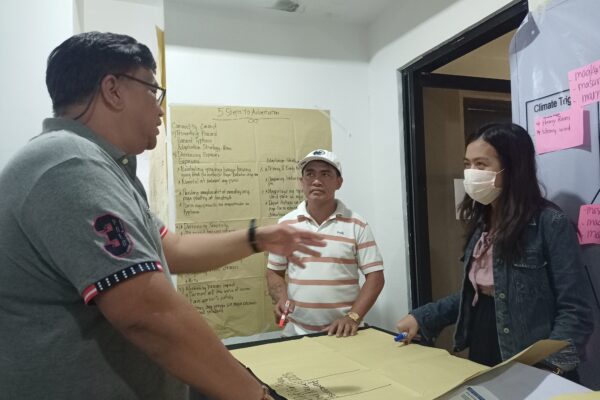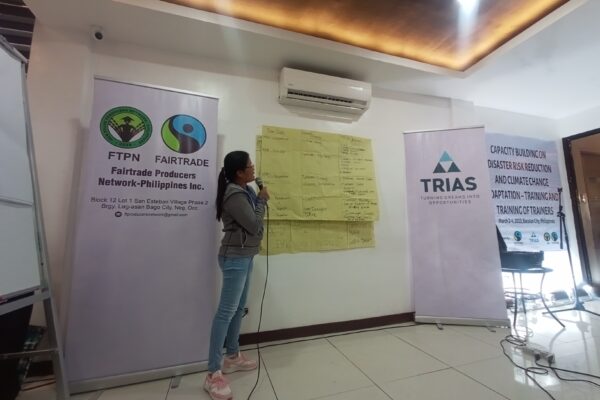In 2022, Fairtrade NAPP conducted a survey among farmers’ producers in Asia and the Pacific to evaluate the needs of Small Producers’ Organizations (SPOs). The survey revealed that 40% of SPOs in the Philippines require organizational capacity building as climate change-induced disaster risks remained the most significant threat to the well-being and livelihoods of small producers. SPOs also expressed their concerns regarding the threat of climate change and the lack of adaptive capacity among farmer producers and their organizations. Hence, there is a growing need for support and interventions by these Small Producer Organizations to adopt resilience climate change practices.
In response, round 1 of the “capacity building on disaster risk reduction and climate change adaptation training and training of trainers” program was organized by the Fairtrade NAPP and Fairtrade Producers Network in partnership with TRIAS SEA at the Phillipines. This 3-day event was participated by representatives from 9 Small Producer Organizations in the Philippines. The primary objectives were to enhance awareness and comprehension of targeted SPO members and foster a deeper understanding among potential participant-trainers about the fundamental concepts of disaster risk management and climate change adaptation while improving their skills to deliver and implement the training. Additionally, this program also aimed at describing the general processes and prerequisites for integrating DRRM and CCA and identifying specific methodologies and tools for more inclusive and sustainable agricultural and organizational development.

Throughout the 3 days, various sessions were conducted that allowed participants to understand and examine their activities to develop action plans based on capacity and feasibility assessment. There were various open forums where participants expressed their thoughts.
- Session 1: Understanding climate, climate change including the causes and effects on farmers and the communities.
This aimed to establish a shared understanding of climate, weather, and climate change. The session examined the human contribution to climate change and discussed its impacts on farmers’ lives, livelihoods, and well-being based on both farmer experiences and scientific studies. This session especially gave emphasis on the actual impact of the contribution of human behaviour to climate change vulnerability and its role in mitigating climate change. The connection between farmer experiences and scientific projections of future climate change was also established. The session concluded with interactive activities, such as the modified Dodgeball to enhance participation among different representatives.
- Session 2: Lecture and Workshop: Enterprise/Livelihood Hazard, Risk, Vulnerability and Capacity.
The focus of the topic was to identify climate change-induced hazards that have the potential to impact farmers’ livelihoods and communities. Historical data and farmers’ experiences were used to assess climate hazards in terms of their probability and severity of impact. Participants were able to pinpoint the most significant hazards affecting farmers’ livelihoods using a community hazard map. The seriousness of a hazard was determined by its high probability and impact which indicated its importance for adaptation efforts. Various tools, such as seasonal calendars, disaster histories, and community maps, were utilized to identify the areas sensitive to potential hazards, analyze the impacts and were tailored to suit the participants’ needs.
- Session 3: Climate Change Impact Chain among SPO and Member Livelihood.
The focus of this session was on establishing the impact chain of climate change. This involved identifying the triggers of climate change and understanding their immediate effects on various components of livelihoods and at-risk households. The impact chain analysis also involved assessing the vulnerability and sensitivity of different livelihood elements and farmer households. The session concluded with assessing the overall human impact of climate change disasters. The results of this impact chain analysis served as a foundation for the next session which involved identifying adaptation options for farmers’ livelihoods and households.
- Session 4: Climate Change Resiliency: Agricord 5 Steps to Resiliency.
This session consisted of discussions and activities centred around five key steps for climate change adaptation based on the earlier session. These steps included: 1) Reducing exposure to hazards, 2) Implementing climate change mitigation measures, 3) Decreasing sensitivity to climate impacts, 4) Addressing other stresses, and 5) Minimizing human impact on the environment.
A comprehensive list of adaptation strategies for farmers was thus compiled. This list was then evaluated for feasibility assessment that considers factors such as cost, ease of implementation, and availability of resources. Following the feasibility assessment, the adaptation strategies were further refined based on the capacity of farmers to implement them.
The capacity analysis results served as a basis for action planning that involved identifying the necessary capacity-building initiatives and support required to successfully implement the identified climate change adaptation actions.
- Session 5: Workshop on CCA Planning.
Based on earlier sessions, this session involved formulating comprehensive action plans to implement the Climate Change Adaptation strategies among the SPO. The strategies were categorized into immediate (3-6 months), intermediate (6-1.5 years), and long-term (1.5-3 years) timeframes. This strategic approach ensured that the CCA Plan could be effectively implemented by all involved stakeholders.

Additionally, some of the participants went to Don Salvador, Benedicto, Negros Occidental to visit the Demo Farm of Pandanon Integrated Balangon Farmers Association (PIBFA). This gave them a first-hand experience to apply the knowledge gained and learn from practical experience. This program enabled them to enhance the farming practices of organizations and their members. Hence, producer organizations can ultimately contribute to a fairer and more sustainable economic system which is climate change adaptive and sustainable.







